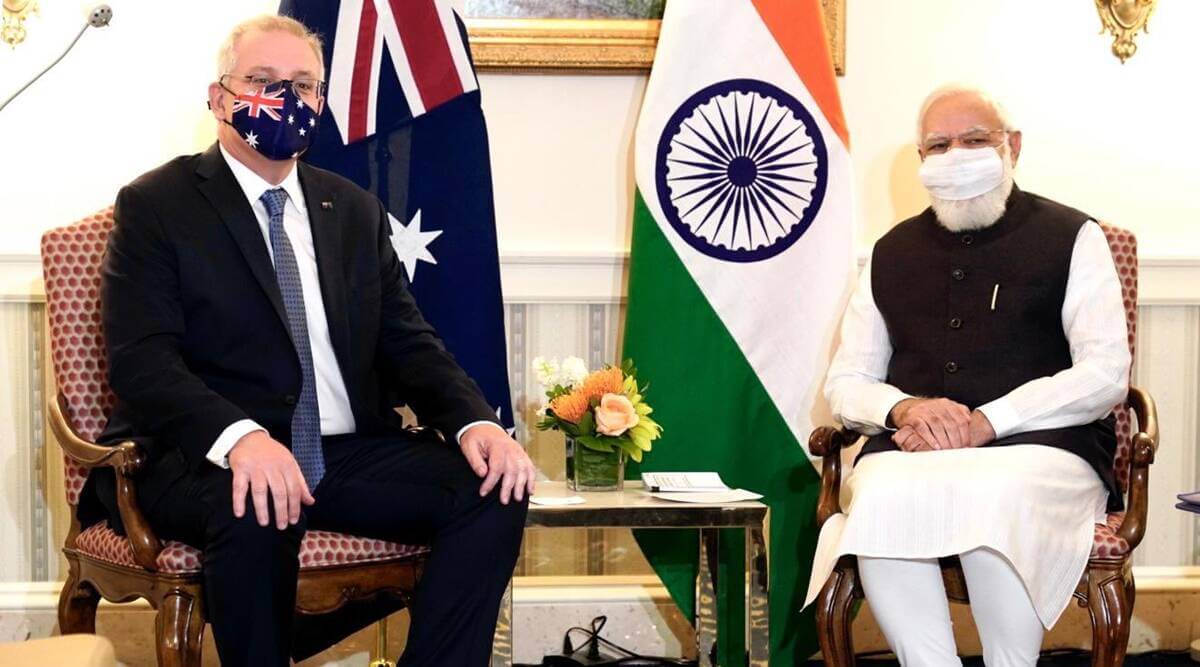During a virtual meeting on Monday, Indian Prime Minister Narendra Modi and his Australian counterpart Scott Morrison both stressed that the Quad’s focus must remain on Indo-Pacific security, rather than on the Ukraine crisis. Their comments come at a crucial time, as United States (US) President Joe Biden has singled India out as the only Quad member that has not yet condemned Russia.
Excellent discussion with my friend PM @narendramodi on our partnership, the Indo-Pacific, Myanmar & Ukraine. New initiatives include skills & innovation, maritime security, green steel, critical minerals & a Centre for Australia-India Relations to strengthen ties even further. pic.twitter.com/7Fn8KYOXsE
— Scott Morrison (@ScottMorrisonMP) March 21, 2022
According to the Indian Ministry of External Affairs, Modi and Morrison celebrated the progress made after the establishment of the Comprehensive Strategic Partnership during their first virtual discussion in June 2020. In this regard, PM Modi celebrated the enhanced scope of their partnership, which includes cooperation in trade and investment, defence and security, and COVID-19 related research.
Modi also expressed his gratitude towards the Australian PM for returning 29 ancient artefacts that were stolen from India, including the 12th Century Chola bronze artefacts and several other sculptures, paintings, and photographs.
#WATCH | PM Modi inspects the 29 antiquities which have been repatriated to India by Australia. The antiquities range in 6 broad categories as per themes – Shiva and his disciples, Worshipping Shakti, Lord Vishnu and his forms, Jain tradition, portraits and decorative objects. pic.twitter.com/uQiKdlCdtX
— ANI (@ANI) March 21, 2022
Both leaders also agreed to expedite the conclusion of an early harvest deal and a Comprehensive Economic Cooperation Agreement (CECA). Following the meeting, Australia announced $200 million worth of investments in India in sectors such as clean technologies, space, and innovation. In addition, they signed a Memorandum of Understanding (MoU) to promote cooperation in critical minerals sectors, including lithium, cobalt, and vanadium, of which Australia has large reserves.
Australian and Indian trade officials have recently said that the signing of a free trade agreement is imminent following ten years of discussions. The CECA would boost cooperation and opportunities in tourism, energy, agriculture, education, and infrastructure. It would also grant Indian pharmaceutical companies more access to the Australian market and also include duty concessions on gems, jewellery, and textiles. In fact, India is also negotiating a ‘Mutual Recognition Agreement’ (MRA) for easier clearance of pharmaceutical products approved by developed countries. Bilateral trade is already on the rise and an FTA would only further benefit the two countries. In fact, in 2020, the two-way trade of goods and services between India and Australia amounted to $24 billion, compared to $13.6 billion in 2007.
Away from trade, the two PMs also talked about Russia’s ongoing military operation in Ukraine. In this regard, Morrison said Moscow must be held accountable for its “unlawful invasion.”
However, neither leader dwelled on the topic for too long, instead seeking to steer the discussion towards the Indo-Pacific. To this end, Morrison said that India and Australia must work together to ensure that China’s aggressive activities in the Indo-Pacific don’t lead to a similar result as the “terrible situation in Europe.” He stated that while both countries are “distressed” about the deteriorating situation in Europe, the “focus” of their bilateral engagements and interaction via the Quad will remain on the Indo-Pacific.
Indian PM Modi refrained from making any reference to the Ukraine crisis during his televised opening statement. However, following the discussions, Foreign Secretary Harsh Vardhan Shringla reported that Australia understood India’s position on the issue, which they agreed was a result of New Delhi’s “own situation” and its “own sort of considerations.” According to Shringla, the two leaders agreed that the ongoing humanitarian crisis in Europe should not act as a reason for the Quad to “divert [their] attention from the Indo-Pacific.”
My remarks at the India-Australia virtual summit with PM @ScottMorrisonMP https://t.co/TLBmappqgI
— Narendra Modi (@narendramodi) March 21, 2022
This sentiment was echoed by Australia’s envoy to India, Barry O’Farrell, on the eve of the virtual meet, wherein he said that Quad allies have “accepted” India’s stand on the Ukraine conflict, adding that New Delhi’s decision would not impact the alliance. In fact, he appreciated Modi for using his “contacts” in Russia to push for an end to the violence in Ukraine.
However, the US has been less welcoming about India’s neutral stance. While addressing a Business Roundtable’s CEO Quarterly Meeting at the White House on the same day as the Modi-Morrison summit, Biden criticised India for its “somewhat shaky” position on the Ukrainian crisis.
Breaking:Quad Countries have accepted India's position,each country has bilateral relation & it's clear from the comments of MEA,PM that he has used his contacts to call for the end of the conflict & no country wil be unhappy with that:Australia Envoy @barryofarrell on Ukr crisis
— Sidhant Sibal (@sidhant) March 20, 2022
India is the only Quad ally that hasn’t openly criticised Russia’s military aggression in Ukraine. It also abstained from voting against Moscow in the United Nations Security Council (UNSC), where it currently holds a non-permanent seat, and the UN General Assembly.

